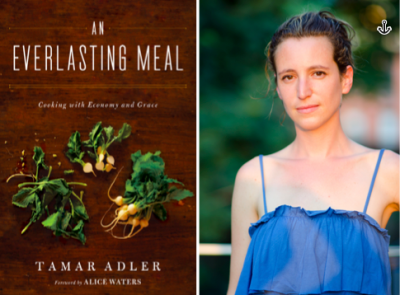We believe that all of the gastrognomes that we profile, no matter how little we know them, or how coincidentally we came across them, wind up here in this collection for a reason. Tamar is here this week for those of you who dream of writing. She came to tell you that though your path may be circuitous, if food is your passion, you will find your way. We could all benefit, even those who rarely use a pen except to sign their names, from the reminder that writing is not easy, and it requires many, many drafts and a big dose of faith.
When did you know that you wanted to work in food?
I've been caught between food and words for most of my life. I knew I wanted to read and write for a living, but it was while I was an editor at Harper's Magazine and found myself rushing to the farmers' market every Monday, Wednesday, and Friday, and keeping baskets of wild mushrooms on my desk, and handing out recipes to fellow editors that I realized my heart was pulling me toward the kitchen. Each time I would drift away from cooking-almost going to law school, for example-I'd find myself snagged on my love of it. Visiting Michigan Law, I missed a class on immigration and asylum, which I was planning to study, hunting down the best Asian grocery in Ann Arbor. At Georgetown Law, which I also considered, I got in an argument with my tour guide about the quality of the food-poor-at the concession stand in the gym. The last time I nearly left the field I was en route to a mid-career journalism program at Columbia, then shifted gears and signed a contract to write An Everlasting Meal: Cooking with Economy and Grace.
How did you get your current good food job?
I was sitting in a bar in San Francisco with a friend and we both admitted to each other that what we really wanted to write How to Cook a Wolf (the 1942 book by M.F.K. Fisher on which mine is based) for today. We decided to start working on a book proposal together. She was incredibly busy, so never got around to writing anything, but I started turning out pages and pages, and eventually she pointed out that I was writing it alone. I sent what I had off to an agent, wrote some more drafts, and sold it to Scribner, who just published it.
How did your previous work or life experience prepare you for a good food job?
The lucky thing about a winding path, which I've had, is that it's impossible to identify what went right and what went wrong. So all you can do is assume that everything you've done has led to this. I've always wanted to write a book-and really always wanted to write some version of this one.
What was the greatest obstacle you had to overcome in pursuing your Good Food Job dream?
I've opened a restaurant, worked Saturday lunch at Chez Panisse café during oyster season, and not done anything as hard as write a book. I almost gave up a thousand times. It seems you'll never get it right. It seems you have to fight for everything. It takes more confidence than I've ever had-and probably ever will-to send your words out into the world, untended. It's stressful and perilous, and I only kept going because I knew I had something to say and a way to say it, and I thought it would be helpful, if it ever made it out there.
What can you identify as the greatest opportunities in food right now?
Teaching cooking. We are newly hungry to cook, and as often, the younger generations are going to be teaching the older ones. We need brigades of skilled, compassionate cooks, ready to pass on not only skill, but compassion, and confidence.
If you could be compensated for your work with something other than money, what would it be?
Artichokes. Or good meals served to people who needed them.
Related Jobs









